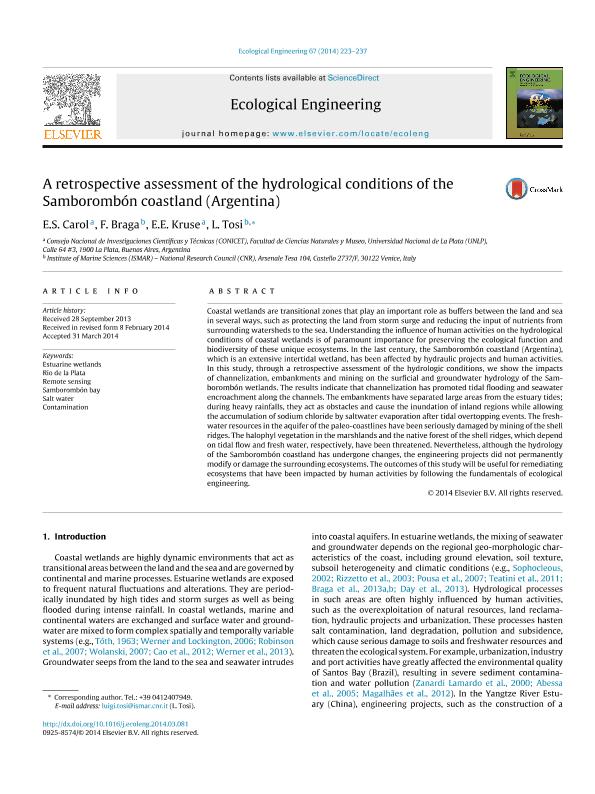Mostrar el registro sencillo del ítem
dc.contributor.author
Carol, Eleonora Silvina

dc.contributor.author
Braga, F.
dc.contributor.author
Kruse, Eduardo Emilio

dc.contributor.author
Tosi, L.
dc.date.available
2017-12-20T20:54:31Z
dc.date.issued
2014-03
dc.identifier.citation
Tosi, L.; Kruse, Eduardo Emilio; Braga, F.; Carol, Eleonora Silvina; A retrospective assessment of the hydrological conditions of theSamborombón coastland (Argentina); Elsevier Science; Ecological Engineering; 67; 3-2014; 223-237
dc.identifier.issn
0925-8574
dc.identifier.uri
http://hdl.handle.net/11336/31179
dc.description.abstract
Coastal wetlands are transitional zones that play an important role as buffers between the land and sea in several ways, such as protecting the land from storm surge and reducing the input of nutrients from surrounding watersheds to the sea. Understanding the influence of human activities on the hydrological conditions of coastal wetlands is of paramount importance for preserving the ecological function and biodiversity of these unique ecosystems. In the last century, the Samborombón coastland (Argentina), which is an extensive intertidal wetland, has been affected by hydraulic projects and human activities. In this study, through a retrospective assessment of the hydrologic conditions, we show the impacts of channelization, embankments and mining on the surficial and groundwater hydrology of the Samborombón wetlands. The results indicate that channelization has promoted tidal flooding and seawater encroachment along the channels. The embankments have separated large areas from the estuary tides; during heavy rainfalls, they act as obstacles and cause the inundation of inland regions while allowing the accumulation of sodium chloride by saltwater evaporation after tidal overtopping events. The freshwater resources in the aquifer of the paleo-coastlines have been seriously damaged by mining of the shell ridges. The halophyl vegetation in the marshlands and the native forest of the shell ridges, which depend on tidal flow and fresh water, respectively, have been threatened. Nevertheless, although the hydrology of the Samborombón coastland has undergone changes, the engineering projects did not permanently modify or damage the surrounding ecosystems. The outcomes of this study will be useful for remediating ecosystems that have been impacted by human activities by following the fundamentals of ecological engineering.
dc.format
application/pdf
dc.language.iso
eng
dc.publisher
Elsevier Science

dc.rights
info:eu-repo/semantics/openAccess
dc.rights.uri
https://creativecommons.org/licenses/by-nc-sa/2.5/ar/
dc.subject
Estuarine Wetlands
dc.subject
Rio de La Plata
dc.subject
Remote Sensing
dc.subject
Samborombon Bay
dc.subject
Salt Water
dc.subject
Contamination
dc.subject.classification
Meteorología y Ciencias Atmosféricas

dc.subject.classification
Ciencias de la Tierra y relacionadas con el Medio Ambiente

dc.subject.classification
CIENCIAS NATURALES Y EXACTAS

dc.title
A retrospective assessment of the hydrological conditions of theSamborombón coastland (Argentina)
dc.type
info:eu-repo/semantics/article
dc.type
info:ar-repo/semantics/artículo
dc.type
info:eu-repo/semantics/publishedVersion
dc.date.updated
2017-12-12T18:25:22Z
dc.journal.volume
67
dc.journal.pagination
223-237
dc.journal.pais
Países Bajos

dc.journal.ciudad
Amsterdam
dc.description.fil
Fil: Carol, Eleonora Silvina. Universidad Nacional de La Plata. Facultad de Ciencias Naturales y Museo; Argentina. Consejo Nacional de Investigaciones Científicas y Técnicas. Centro Científico Tecnológico Conicet - La Plata; Argentina
dc.description.fil
Fil: Braga, F.. Centre National de la Recherche Scientifique; Francia
dc.description.fil
Fil: Kruse, Eduardo Emilio. Consejo Nacional de Investigaciones Científicas y Técnicas. Centro Científico Tecnológico Conicet - La Plata; Argentina. Universidad Nacional de La Plata. Facultad de Ciencias Naturales y Museo; Argentina
dc.description.fil
Fil: Tosi, L.. Centre National de la Recherche Scientifique; Francia
dc.journal.title
Ecological Engineering

dc.relation.alternativeid
info:eu-repo/semantics/altIdentifier/doi/http://dx.doi.org/10.1016/j.ecoleng.2014.03.081
dc.relation.alternativeid
info:eu-repo/semantics/altIdentifier/url/http://www.sciencedirect.com/science/article/pii/S0925857414001414
Archivos asociados
